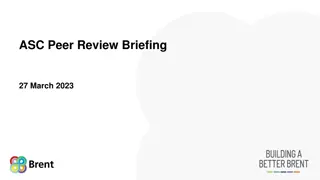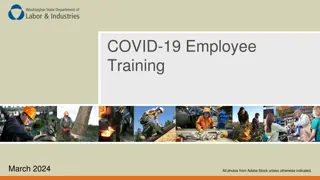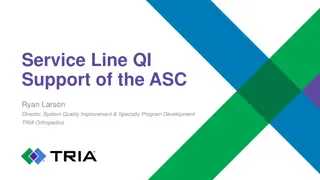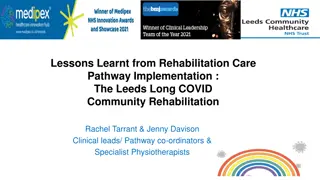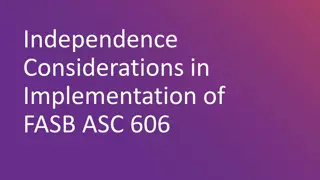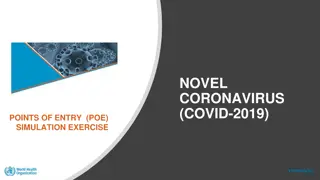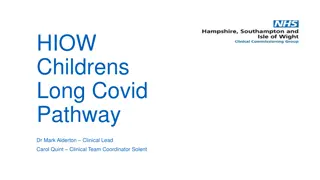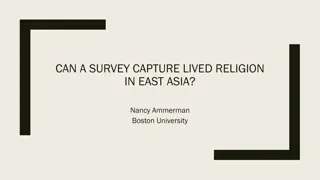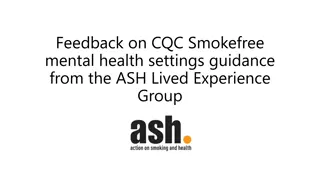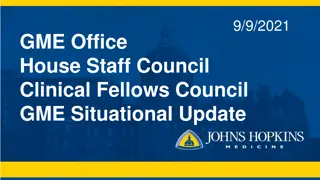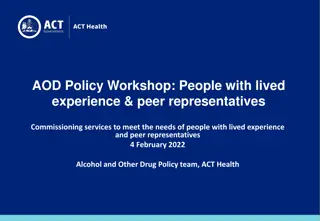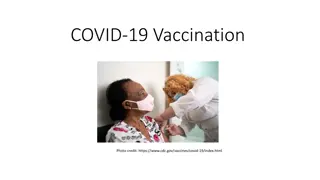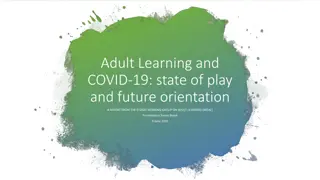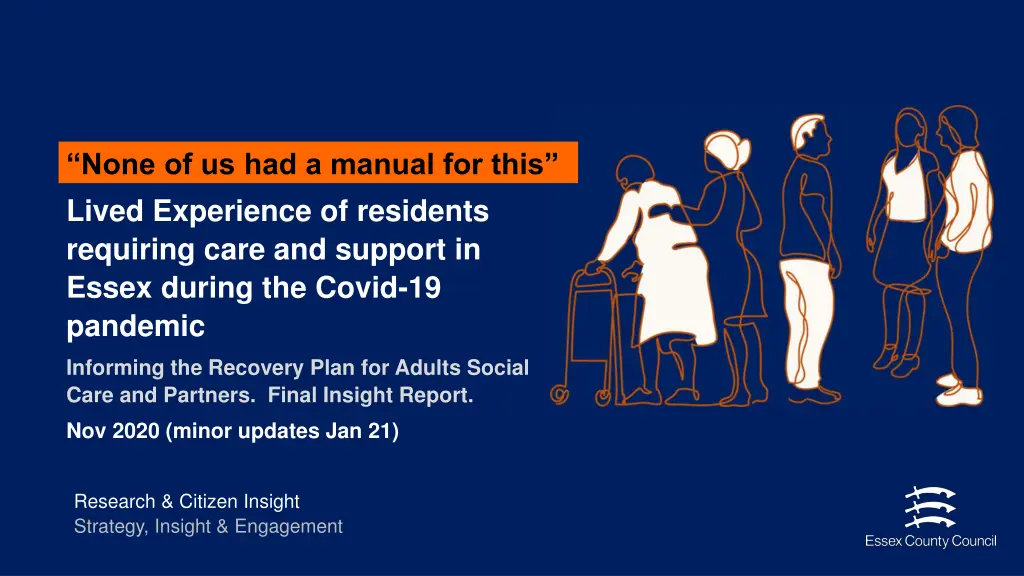
Insight Report on Residents' Experiences During Essex Covid-19 Pandemic
This final insight report explores the lived experiences of residents requiring care and support in Essex during the Covid-19 pandemic, offering valuable insights to inform the recovery plan for adult social care and partners. It delves into the impact on vulnerable individuals, changes in support systems, and strategies for overcoming challenges, providing a comprehensive understanding of the diverse impacts of the pandemic on different groups and populations.
Download Presentation

Please find below an Image/Link to download the presentation.
The content on the website is provided AS IS for your information and personal use only. It may not be sold, licensed, or shared on other websites without obtaining consent from the author. If you encounter any issues during the download, it is possible that the publisher has removed the file from their server.
You are allowed to download the files provided on this website for personal or commercial use, subject to the condition that they are used lawfully. All files are the property of their respective owners.
The content on the website is provided AS IS for your information and personal use only. It may not be sold, licensed, or shared on other websites without obtaining consent from the author.
E N D
Presentation Transcript
None of us had a manual for this Lived Experience of residents requiring care and support in Essex during the Covid-19 pandemic Informing the Recovery Plan for Adults Social Care and Partners. Final Insight Report. Nov 2020 (minor updates Jan 21) Research & Citizen Insight Strategy, Insight & Engagement
Introduction Situation Challenge Key questions explored How have vulnerable people been impacted? How have people's experiences of support changed (including family, neighbours, community, and care providers)? How have people overcome the challenges? What has worked well? What could be different? What ideas do people have? The COVID-19 pandemic is being experienced differently by different groups and population. Commissioners and senior leaders across ECC's Adult Social Care function seek insight in people's experiences of COVID-19 to inform their work with partners (including the NHS) and to inform recovery plans. Public agencies' response to the pandemic has brought about changes in the way public spaces and public services work including care and support services. 30/11/2020 | 2 Produced by Essex County Council Chief Exec's Office
Approach About the research Drawing on existing channels With thanks to: Collaborate in Action Forum, Healthwatch Essex and Summit. We drew on these existing channels to help deliver the research alongside that conducted by Essex County Council. Fieldwork was conducted between end July early November 2020. We used a common research design framework to ensure consistency. 2 Collaborate in Action Forums 10 focus groups 28 interviews (participants aged 21-86, Pan-Essex) A survey targeted to 2,200 adults social care users and promoted widely publicly 2 Collaborate in Action forums Jul 20 10 focus groups Jul to Sept 20 28 one-to-one interviews Jul to Nov 20 321 survey respondents Sept to Oct 20 This includes participants who: Physical impairment & long term conditions Learning disability and autism Carers A special thank you to all our participants who gave up their time to improve outcomes and services for others. Sensory impaired Mental health concerns Older people We use pseudonymsthroughout to protect people s identities. Many crossed more than one of these groups. | 3 30/11/2020 Produced by Essex County Council Chief Exec's Office
About the report COVID-19 pandemic has impacted on all communities, but it has had a profound impact on vulnerable and disabled people. This report provides insight on the experiences of a wider range of vulnerable and disabled adults. It draws on the experiences of those who use social care support (self-funders and those supported by ECC); those who receive support through the voluntary and community sector and from friends, families and communities. It also draws on the experience of carers. The report is not a commentary on the effectiveness of specific services or organisations. 30/11/2020 | 4 Produced by Essex County Council Chief Exec's Office
Our central findings Many vulnerable and disabled people have experienced extraordinary care and support, from professionals and community groups. Some report being cut-off from businesses and shared spaces, and restricted access to services, support and activities. The shock of the COVID-19 crisis - lockdowns and guidance around shielding - has restricted the role that families, neighbours, informal carers and professionals have played in supporting vulnerable people. While most residents can easily adjust to changes, new ways of working or new safety measures, those with specific needs, vulnerabilities or disabilities, can face unique challenges particular to their situation. This has diminished the ability of vulnerable and disabled people to go about their daily lives and impacted their independence and wellbeing. For others, adjustments in care and support provisions have created unmet needs, and new challenges. COVID-19 has also changed the way that care and support organisations operate. | 5 Produced by Essex County Council Chief Exec's Office 30/11/2020
There are many positive stories and examples of excellent practice to build on. Building upon this good practice will be important in addressing the impacts that have led some vulnerable or disabled people to report feeling: Residents report that this has caused: Unsupported and forgotten Unheard and excluded a loss of confidence, avoiding going out, loneliness and isolation a decline in physical, emotional and financial wellbeing. Cut-off and less connected Frightened Participants reported that periods of lockdown were the most challenging, but some residents were still not coping well when restrictions were eased and reported feeling worse as time goes on. The research was conducted between July and November 2020. Without a concerted effort to meet the needs of vulnerable and disabled people within the context of the rules and restrictions put in to manage the spread of COVID-19 infections, these groups will continue to experience barriers to independence and reduced wellbeing. | 6 30/11/2020 Produced by Essex County Council Chief Exec's Office
What changed for people with a vulnerability or disability during Covid-19?
Most survey respondents said there was no change to their care and support but, where there were changes, these generally had a negative impact on individuals. Familywas most likely to have helped or supported respondents but, a slightly lower proportion were supported during Covid-19 across all categories compared with before. Over a quarter of survey respondents, experienced a change to their care or support, 68% told us there was no change Who helped or supported you Top 5 shown 28% 67% 65% Family Changes to care and support (Top 5 negative and positive impacts shown) 62% 58% Care providers 53% 52% 31% 29% Friends 23% 16% 14% 18% Community/voluntary organisations 15% 14% 9% 7% 6% 3% 17% Social workers Health impaired Do activities I enjoy Spend more time Lack of independence None friends care or support independence Better care support Mental health impaired 10% Lack of or change of care arrangements Increased Lack of family and indoors Before Covid-19 During Covid-19 Several of our research participants talked about reduced contact from social workers since March, whilst others had regular and good quality communication. There were 297 responses to this question. 56% (167) were ASC service users. Others received care and support from friends/family, EWS or were carers who don t receive support. Negative impacts Postive impacts Number of respondents who experienced a changed was 88 8
Although people largely received information in person, there has been a decrease in this method, during Covid-19 and increase in post, phone, email and online. Respondents continued to seek information informally through friends and family, rather than more formal routes. How people received information Top 5 shown Who are you getting your information from during Covid-19 -Top 5 shown 51% From family & friends 50% In person 37% 38% 40% Not needed any information 17% Post 34% 35% From local support networks/groups Phone 16% Most important is information about: Health (79%) Government guidelines (52%) Accessing food and supplies (48%) Finances (43%) 23% Email Social worker 9% 27% 21% Online (websites, social media, Zoom call etc.) Essex Coronavirus Action Facebook 9% 27% Before Covid-19 During Covid-19 Number of respondents to this question was 314 Number of respondents to this question was 314 9
People say that keeping in touch with friends and family is most important in maintaining their health and wellbeing. It s more important to them than exercising or other pursuits. Exercising out of the home has decreased since Covid-19 but there has been an increase in exercising in the home. Maintaining health and wellbeing Top 5 shown 76% Keeping in touch with friends and family 72% 43% Exercising out of the home 29% Survey respondents use a range of different activities in order to physically and emotionally keep well. 32% Exercising at home 44% 26% 27% Gardening 7% 9% Meditation or Mindfulness Before Covid-19 During Covid-19 Number of respondents to this question was 268 10
Feeling unsupported and forgotten None of us had a manual for this kind of situation. I think for us. I certainly felt abandoned completely [Carers Focus Group 1, North & Mid, Aug 2020] To change systems overnight, to keep people safe was the priority. I think what they have forgotten was all the little vulnerable groups of people. [Hearing Impaired Focus Group, Aug 2020]
Feeling unsupported and forgotten Some participants feel they have been let down and abandoned. This is due to a number of challenges that have impacted people s care, support and emotional health needs. Caused by: Lack of usual care and support Loss of usual support networks and/or infrequent information (everyone with a support need and Carers) Community groups struggling with the demand for those with mental health concerns Mental Health demand People being treated differently from their peers and non- vulnerable residents and feeling forgotten, frustrated and anxious Being treated differently The biggest challenge was not having the support, not understanding what was going on in the outside world. I haven't been in a shop since February. [Deaf Blind Focus Group, Aug 2020] 30/11/2020 Produced by Essex County Council Chief Exec's Office | 12
Feeling unsupported and forgotten Potentially impacting everyone with a support need and Carers. Lack of usual care and support staff Some participants experienced change in the support that they usually receive, particularly at the point of first lockdown. Lack of care and support included: Loss of communicator guides for those visually impaired, respite for carers and personal assistants Friends and family; to protect those shielding and formal care staff Infrequent communication from social workers Cancelled or missed appointments There was a lack of available care and support staff including communicator guides. This impacted levels of confidence, independence and facilitated feelings social isolation. The support just went... Then we get a letter to say that all services are being reinstated... Why weren't you supporting us? We were your customers and a lot of us feel very let down and we didn't know which way to turn. [Deaf Blind focus group, Aug 2020] During Covid-19 Pete was assessed as needing carers at night, however the agency were unable to facilitate a bedtime call, so Edie pays her daughter to do this. ASC has discussed direct payments with Edie but she worries this would be worse financially. [Edie carer for Pete (80s), Interview] How can we ensure enough workforce when individuals circumstances change? Produced by Essex County Council Chief Exec's Office | 13 30/11/2020
Becoming disengaged from support Hannah s Story - A journey to disengagement Hannah is 21 and lives at home with her parents. She has autism and severe anxiety. Hannah has difficulties in going out and making friends outside of her own family circle. This leaves her parents exhausted. Care hours took a long time to set-up and agreed just before lockdown so Hannah could get out more. Counselling was also agreed but failed to happen. Long time to set up Parents Carer changed Met once approached social care 4 hours agreed Disengaged from process Community Hospital Counselling agreed Shift from face to face. Hannah unable to cope with phone call. Teams video call arranged. Hannah was there but Counsellor wasn t. Lost trust and disengaged Lockdown 30/11/2020 Produced by Essex County Council Chief Exec's Office | 14
Feeling unsupported and forgotten Impacts everyone with increased mental health concerns and those with diagnosed disorders. Those more isolated are not fairing as well. Mental health demand has exceeded capacity Participants experienced escalating mental health concerns, at a time when it was difficult to access mental health support. This increased their feelings of being let down as well as increased loneliness. People had difficulty accessing mental health services across both community and health services In some cases they did not receive new support, or referrals into services. Some did not receive help from their usual support. My carers also help me to keep my mental health under control. My mental health has suffered during this time. I m depressed. I m scared to go out in case I bring it back home. I have lost close family members and wasn t able to see them [live overseas], so I haven t had closure yet. My husband was ill in April and can t work yet. He doesn t get sick pay. [Christina, 50s, Physical Impairments and MH, Interview] Survey respondents told us they have a mental health condition (87) 28% How can we improve people s access to mental health services including those in the community? 30/11/2020 Produced by Essex County Council Chief Exec's Office | 15
Mike, 50s, no previous mental health concerns Seeking help for mental health Mike s Story I have never felt so alone in my life Shielding and isolation were the drivers I have never felt so alone in my life and I have never felt so low I was saying things that really scared her [girlfriend]. I can t remember but she said I was talking gobbledegook Mike is in his 50s and hasn t had any previous mental health issues and the decline in his emotional wellbeing was completely unexpected. He shielded at home alone after receiving a text message from the GP and his wellbeing suffered due to the isolation. He feels that he was then targeted for redundancy, due to being off sick just before lockdown and, he lost his job. He went to live with his friend after 10 weeks of isolation, when she became particularly concerned and the risk of Mike s declining health outweighed the risk of Covid-19 for both. He contacted a lot of mental health charities asking for help; paid support would be his last report. Mike is now being supported in the community. Let down... All I got back was an automated email about Covid-19 and what they are not doing. I needed to speak to a person. I never had any sympathy for people who used to say they were depressed... I went from feeling down in the dumps to I don t want to go there, and I am not out of the woods yet. 16 | 16 Produced by Essex County Council Chief Exec's Office
Impacts everyone with a vulnerability, disability or condition. Feeling unsupported and forgotten Being treated differently Participants experienced different levels of care and support from a wide range of services and support. This support was different to what other people, including peers, is receiving. Covid-19, the response, the capability of organisations to respond and the move to digital has caused more instances where these differences are apparent. This inconsistency increased feelings of frustration and anxiety. Examples include: Conditions not recognised as vulnerable Difficulties getting on the vulnerable shopping delivery list during lockdown Differences in hospital treatment and communication from staff some good examples of treatment, allowing support and communication at Addenbrookes and Broomfield It feels like if you had Covid you were allowed in if you haven t you can't be coming in. That s how it feels [Long-term Conditions Focus Group, Aug 2020] How can we improve consistency across peoples experiences of services? 30/11/2020 Produced by Essex County Council Chief Exec's Office | 17
Being treated differently affects peoples perception of others and how they feel about themselves too . I was in Colchester hospital and it was more confusion because they didn t know what was going on. Because of Covid-19 they obviously wanted to get rid of people as quick as they can to stop people getting ill. But they didn t resolve my problem. So if it happens again lets hope it isn't major. [Long-term Conditions Focus Group, Aug 2020] Being left out of shielding status causes frustration, worry and makes people feel disrespected. It impacts what they may be entitled to and when. Some people here have the same conditions as me and they have received shielding letters and I haven t. So the disparity over that. I have stuck myself in clinically vulnerable . My GP signed me off. [Long-term Conditions Focus Group, Aug 2020] Others had a good experience of communication; a doctor explained to a visually impaired patient she was wearing a mask and coming closer to her. Having a nurse take bloods and, you know, the close contacts and the communicator guide in the room and obviously the surgeon himself come in all masked up and we were masked and the communication was very... I couldn't hear, couldn t really see very well. [Deaf Blind focus Group, Aug 2020]
We spoke to participants about their care now and in the future Some participants are content with how things are and it forms their future wishes: Level of care hours to remain Remain where they are (at home, supported housing or residential care) For some where they are now will be their last home. For others they are looking for a change: Accommodation and support that enable more or continued independence is key There was an understanding among carers and older people that residential care provides a safe environment where they or their family member can be cared for, when they are unable to continue to live where they are. James, 70s uses a wheelchair. Carers visit twice a day. He has kidney failure so anticipates this is his last home. Some of his carers are friendly, anticipate his needs and do extra tasks like getting his clothes from the dyer. A bidet would make his life better for now, but he was told he wasn t entitled to one as he didn t have bed sores. I really do not want him to go back there [residential care]. His health suffered so much under them We know one day that he s got to have a home away from us because we re not going to be here [Older Carer, Chelmsford] I would be happy to have support in my home when I am older. I do not want to go into a residential home. I spent many occasions in hospitals and home settings when I was sectioned, and I don t want to go back to that type of place again. [Maggie, 40s, Supported housing] Produced by Essex County Council Chief Exec's Office | 19 30/11/2020
Good practice and whats important to people that could be built on, so people feel supported Our participants told us about their positive experiences during this time and the things that were most important to them. Caring professionals, high quality care, no break in support and quality conversations were important throughout. Learning from the first lockdown was seen as key in future planning. Consistent, high care standards Access to Mental Health support Caring professional practice Caring, safe environment & respite Regular contact from care homes Safe environment Package increases when needed were appreciated! Independent living Older carers need right care in place Recognition for carers Work, life, caring balance & respite Consistently high care & hygiene standards Helpful social workers it s appreciated! Caring care and dedication to the job; understanding, friendly, respectful, thoughtful and active listening Care and support that meets needs and supports independent living No break in support Consistently high care standards Clear routes for additional help if needed Response email / contact from services Talking to a person Consistently high service standards | 20
During this pandemic, I am most proud of . My aspirations . The relationship with my husband. We have come closer together. It s been good for us. When Covid is over ... I intend to travel it s an eyeopener. I love to travel, I ve been to so many places You can still travel with a disability. If you have willpower you can do anything. the way I was able to adapt to being at home. I have found it very difficult and have low moods, but not now. To keep my son home with the family and out of the residential placement until I can look to move him into independent living close to family Getting through this difficult time, staying safe and well. My grandchildren. The youngest is going into the army. She s making us proud in a different way | 21
Feeling unheard and excluded It is difficult for everyone to be top priority; they want to look after the population. And they are just looking after the ones that are easy to look after. [Hearing Impaired Focus Group, Aug 2020] Apart from Deaf Blind UK that were quite on the ball, I don't think any of the agencies were really and you do feel totally let down [Deaf Blind focus Group, Aug 2020]
Feeling unheard and excluded People feel they have been missed out of decisions and planning that affects them, impacting people s self-worth and confidence, and their independence. This was brought about by: Enjoying public spaces Unclear town & business signs, arrows and colours, lack of clear masks, intercom (sensory impaired, LD&A, physical impairment) Missed out of conversations about care or changes to care arrangements. Or due to communication difficulties; GP automated phone systems and call-backs (hearing impaired) Excluded from conversations Inaccessible guidance Long inaccessible documents. ECC s first communication was not accessible; getting it right will prevent disengagement. People can be nasty when you are out with the guide dog and accidentally brush them or don t follow the arrows [Visual impairment] Produced by Essex County Council Chief Exec's Office | 23 30/11/2020
Some challenges are specific to those with sensory impairments and some physical conditions Feeling unheard and excluded Enjoying public spaces Participants have had difficulties enjoying public spaces and some of that has been due to town signage, inability for those sensory impaired to social distance and the use of masks. The public are unaware of these difficulties. This increases their feelings of anxiety, and reduced confidence. For some this means they are avoiding going out. This has an impact on spending money in businesses. Examples include: Signs and arrows used for directional use not suitable for Blind and visually impaired people. Colours also need to be carefully considered. Key workers not using clear masks which can affect communication from those that lip read or use facial expressions to communicate (e.g., cerebral palsy) I don't do signs. I don't do social distancing and I don't follow arrows on the street because I can t. [Visually Impaired Focus group, Aug 2020] How can we support residents with disabilities or vulnerabilities better in public spaces? 30/11/2020 | 24
Excluded accessing public spaces and services We get anxious and nervous People with sensory impairments find it very difficult to socially distance. Guide dogs do not know how to socially distance and will often stop at closed exits without the person understanding why. People that use tactile sign language or need to touch their environment are not able to distance. There is a lack of public awareness about disability. Social distance is a huge problem its exactly the reason why we don't go out, because we get anxious and nervous, because we can t socially distance in the same way. We don't know the street systems in the towns that we live in unless we have the support. [Deaf Blind Focus Group, Aug 2020] People wearing masks and I am not able to lip read, and I rely on lip reading and facial expressions. So, I am not sure whether they are talking to me or what they are saying. [Hearing Impaired Focus Group, Aug 2020] 30/11/2020 Produced by Essex County Council Chief Exec's Office | 25
Impacts everyone with a vulnerability, disability or condition Feeling unheard and excluded Dismissed during or excluded from conversations Participants told us that they sometimes felt: Dismissed or ignored when spoken to by professionals Excluded from decisions that affect them; their care, support and health Difficulties with good conversations with GPs; call backs and intercom systems People with LD&A found GPs automated phone systems difficult Professional conversations are important in helping people to feel included, supported and respected. Not being listened to can be frustrating and lead to anxiety and a lack of confidence. Poor communications increased feelings of being left out, frustration and worry and health. A lot of people talk to the wheelchair and not to you a lot of NHS staff do that They think you don t have the same worth or you re not contributing to society. People can be focused on what you do not who you are. [Linda, 60s, Physical Impairments, Interview] In a lot of places, they are having intercoms, again like, doctors and having to make phone calls, a lot of them rather than going into places and speaking in person. So, I am struggling with that side of things. [Hearing Impaired Focus Group, Aug 2020] Getting it wrong can make people feel marginalised and left out of decisions that affect them. How can we get it right every time?
Repeating what she needs and not feeling heard My life is a misery Steph s Story Worn out trying to get what I should Steph is in her late 70s and has a progressive illness that affects her mobility. She lives in supported housing and enjoyed an active social life which has now stopped due to Covid-19. She needs 5 timely visits a day to reduce risk of infections. She has been through terrible things with providers, which has left her feeling very frightened and alone. Good care for Steph would be people who listen to me, to be gentle and caring . Do they think I m a zombie or I can t speak for myself. I have capacity . 2nd provider in place 3rd provider put in place without discussion Now I m dependent maybe I shouldn t expect to have so much normal life. On the other hand, why shouldn t I Breakdown of relationship with care provider after long decline Relationship with provider breaks down - deviates from care plan Looking to direct payments to source 10pm visit About being put to bed at 9 pm. I don t think it s fair, and I m very unhappy about it to me it s not normal . 3rd provider deviates from care plan 30/11/2020 Produced by Essex County Council Chief Exec's Office | 27
Impacts everyone but e.g. people with Sensory impairments and Older people, are finding things more difficult. Feeling unheard and excluded Inaccessible guidance Accessible guidance helps people to feel respected and make decisions. Not doing this undermines trust in an organisation and causes people to disengage. For some this may have led to a lack of awareness around support and services. Accessibility - Get it right from the start! Participants told us ECC s first communication was not accessible. Residents struggle with inaccessible (small font, printed information, websites) or lengthy documents, application forms and guidance and can become disengaged. Poor communications increased feelings of being left out, frustration and worry. The information that we got from ECC was obviously very useful for those people that could read it I went on an agency Facebook page.. when you think about how many people don't have the access, they wouldn't have known about anything that was happening [Deaf Blind focus Group, Aug 2020] How can we get communications right every time? 30/11/2020 Produced by Essex County Council Chief Exec's Office | 28
Increasing feelings of exclusion Inaccessible guidance and access to information about services Participants told us ECC s first communication was not accessible. A number of participants were unaware of some newer services e.g. Essex Wellbeing Service but may have been getting support from other routes. ECCCovid-19 bulletins, facts and questions notification from the Council; providing carers with support worked well. Information about direct payments that could be used for other support was also well received. The first thing that came to our doors from ECC was a massive envelope and that is information overload. To get to the bit that was relevant to us was really difficult because it had not come in an accessible format [Deaf Blind focus Group, Aug 2020] The initial letter that I got from the hospital saying you're extremely vulnerable, was a normal letter [standard font] which can t be read by me. [Visual Impaired Focus Group, Aug 2020] How do people get help if they don t have the internet, a computer or mobile? [Sarah, over 85, Interview] 30/11/2020 Produced by Essex County Council Chief Exec's Office | 29
We spoke to participants about wellbeing and community support they had great things to say! Community groups helped people feel included. They proactively offered practical support and help, to develop skills and talk through concerns. Some participants, not previously in contact with community groups did not know how they were contacted but happy they were. It s been appreciated! I really love the Essex Coronavirus page I think they've done such a good job it's like banter they take the mickey. I think that s such a great way to connect with people rather than being really stand off-ish and government speak. [Physical Impairment Focus Group, Aug 2020] Preparation for lockdown Good examples: Day centres Summit Mencap CVS Essex Wellbeing Service District councils ACL Sports for Confidence I was really surprised that I could get that help. EWS were great they called me every Friday to see if I was ok It was a lifeline. [Mike, 50s, Interview] Activities and Sports Befriending Proactively contacted new and existing customers Other research tells us Response of local community organisations has been positive and are working well together Carer s update (Source: ECC Adults Strategy and Innovation) Welfare calls, safety info Shopping & prescriptions Produced by Essex County Council Chief Exec s Office | 30 30/11/2020
Good practice and whats important to people that could be built on so people feel heard and included Participants were appreciative that they were contacted proactively by a range of different organisations. Inclusive public spaces Inclusive guidance and communications Support from Community groups Innovative ideas from participants Information in accessible formats first time please Reaching out with new offers appreciated! Simple up-to-date information Someone to explain things if needed Accessible ways for accessing services Prepared people for lockdown Proactively contacted existing clients for welfare checks, online safety and activities Developed easy read guides e.g. Summit s Zoom Sensory and disability trained people supporting people to access services and businesses Social workers to help notify people of new services Co-producing town signage and colours Clear masks for key workers Disability awareness raising Produced by Essex County Council Chief Exec's Office | 31 30/11/2020
During this pandemic, I am most proud of . My aspirations . Taking photos in the garden and doing more Kite Flying. I have stayed sane and I ve fulfilled what I wanted to socially. I m fitter and healthier. I m like a different person and I ve managed to travel a little. I love my freedom [Wife moved into Residential Care in March] To have kept well during the pandemic I m closer to my son and helped his health Doing more meetings over the phone. I have lost 1 stone in weight. To sing on a stage in front of people I have been able to adapt in a difficult time. I used to write sitcoms and the BBC were interested in one. I d be able to do this again if I had a decent laptop I can use in bed as I need to lie down a lot [spinal injury] . Being able to cook and turn my hand to domestic chores. My wife says You made it lovely Starting a wellbeing programme for myself & keeping it up | 32
Feeling cut-off and less connected . it s not the same as having a cuddle. I use the video calls on my phone, I haven t seen my friend as I haven t gone out [Nancy, 80s, Carer, Interview]
Feeling cut-off and less connected People feel they have been cut-off from the things that help maintain their health and wellbeing. Caused by: Clinic and centre closures and no suitable alternatives offered are impacting health conditions and recovery Access to health services Work and income Loss of access to work and colleagues has an impact on people s purpose, identity and self-worth Technology access and support No internet, accessibility, poor connections and lack of skill (LD&A, carers) and the closure of support from community offices and businesses. Ongoing support for some. It s not for everyone! I haven t gone outside the house as I m shielding Everything seemed harder to do, that s why I started the seated exercises [Carer, 80s, Interview] 30/11/2020 Produced by Essex County Council Chief Exec's Office | 34
Impacts everyone but e.g. Sensory impaired, LD&A, PI, Carers, Older people are finding things more difficult. Feeling cut-off and less connected Reduced access to health services Reduced or no access to health service and clinics: Health clinic and centres were closed Some not offered alternatives; others were offered alternatives but did not work for them Appointments postponed or cancelled Some health staff / GPs refused to enter homes Concerns that future services will be cut Participants experienced an impact on how well they could maintain their conditions or recover from surgery due to health clinics closures. This increased their worry and concern as well as a decline in emotional and physical health and reduced independence and increasing isolation for some. A carer s husband used to go to a physiotherapy session once a month in a community building. He was offered an alternative of the health worker coming to their flat. The flat was too small to do this safely. No alternative has been offered. [Carers Focus Group, Sept 20] For heavy service users, the pandemic has undermined a perception that the NHS will always be there for them. They have suffered greatly and feel left behind, with delays in treatments and diagnoses worsening health problems. There are growing fears they will go without the care into the future. (Source: Britain Thinks. Patients, public and professionals. Sept 20) How can services and alternatives that work be kept going during times of changing priorities?
Cancelled appointments led to increased anxiety Jody 20s, not able to access health specialists Jody s Story Becoming more isolated without realising Jodyisin her 20s. She was given an emergency residential placement about a year ago as her parents could no longer look after her. She has a planned move in December to supported housing near where her parents live. Jody feels less connected with staff since Covid-19 Distance restrictions, they [the care staff] wear masks all the time... can t have a chat with them you can t judge what mood we [all] are in, now all on face value, less interaction For the last year she has been living with people who are over 55 years old, which makes her feel out of place . Jody has many conditions affecting how she thinks, her vision and mobility. She has a serious mental health condition and is waiting for a new referral to Mental Health services. She also has not been able to access her health specialist services. The cancellation of some regular of these check-ups have led to her having regular panic/anxiety attacks and often presenting at A&E. As a result, she paid privately for a telephone consultation adding to her worsening financial spend. Jody is in regular contact with the RNIB who check in with her by phone. Her care has remained the same during Covid-19, but relationships with her carers have changed and she feels less connected. Cancelled appointments made Jody feel less heard, but not desperate She wants to move into supported living; closer to family, with people who are more her age and gain some independence. She hopes to move in December Where we are able to shop, eat, cook and do day-to-day things
Most survey respondents are not working due to retirement or disability. A smaller proportion are employed (paid, unpaid or furloughed) and smaller still unemployed. Most of our survey respondents are not currently working due to retirement or disability. A small proportion 12% (40) are in paid or unpaid work or currently furloughed. 7% (24) of these are employed or self employed. Only 5% (16) of respondents stated they were unemployed. Employment situation (Top 5 shown n=321) Retired 40% Not working due to disability Most people s financial situation has remained the same since Covid-19 (70%, 221) For 18% their financial situation had worsened (57) Only 3% (9) said their financial situation had got better The worsening financial situation may be due to increased outgoings rather than decreases in income. 37% Employed, furloughed or voluntary work 12% Currently unemployed 5% Shielding (themselves or someone else) 2% 30/11/2020 Produced by Essex County Council Chief Exec's Office | 37
Impacts everyone in paid / unpaid work unable to work from home. Feeling cut-off and less connected Work and income Participants told us that the lack of access to paid or voluntary work, had made them feel lacked purpose, identity and self-worth. Some missed the quality conversations, the colleagues they would usually have around them and work-life balance. For others this also caused a decrease in income. Many were not able to work due to: Shielding Not being able to leave supported housing or Residential Care; Closed workplaces (LD&A, PI) Reduced sitter pool offering respite (Carers) Job losses & shrinking job market (Mental health) Working is not and should not be an age thing, it is about capability to do the job and the experience you bring [Amy, 70s, Carer, Interview] How can we ensure that people maintain their wellbeing even with reduced contact? 30/11/2020 Produced by Essex County Council Chief Exec's Office | 38
Purpose and identity for an older carer Amy (70s) is a Carer and self-employed Amy s Story- Working is not and should not be an age thing Amy is in her 70s, self-employed and a Carer. For Amy working is not just about an income stream but helps to keep her mentally agile, provides her with purpose and a professional identity. It is good brain health and helps me to maintain my professional identity with likeminded people. It is good respite from the caring role and helps to keep me sane. The pandemic has reinforced her own need and desire to keep on working for as long as she can . She is motivated by her need to build her own emotional resilience . Amy s work stopped due to the guidelines, shielding her husband and a reduced pool of sitters . She wishes to return to work. In doing so she would need to increase her network of sitters so she can take on more work with her clients. She tends to use the same sitters her husband is used to. They haven t been able to come to the house due to the risk when Coronavirus was at its peak. She is aware that her husband may not live long and needs to ensure that her day-to-day life is not completely revolving around providing care , otherwise she will not only have to cope with bereavement but also the additional gap in occupancy, feeling redundant and without a sense of purpose. The barriers [to working] are being in a caring role and balancing this with the need to meet family responsibilities whilst meeting my own needs How can Carers be supported to balance their lives and needs and have the right support to enable working and respite?
Impacting everyone but people with LD&A, Sensory impairments Carers & Older people are finding things more difficult. Feeling cut-off and less connected Limited or no internet or phone use Connecting with friends and family is key to boosting low mood. Participants told us accessing the internet hasn t been possible or wanted for everyone. With the huge shift to online information and get togethers not everyone has been able keep connected by technology. For some this may have led to a lack of awareness around support and services. This increased their feelings of disconnection and loneliness and affected emotional wellbeing. Not being able to access the internet could be due to: Loss of access to the internet and / or reduced support to access the internet and make phone calls (LD&A in residential care or own homes); Poor quality connections (Carers) Some technology has poor accessibility functions e.g. Zoom (Hearing impaired / Deaf Blind) For some picking up new skills isn t easy and extra support is needed. For others it s not for them. "Staff helped me on the phone before Covid" ..and now? "I don't really. I miss it" [LD&A Focus Group, Residential Care] How can we help more people get connected, those with and currently without technology? 30/11/2020 Produced by Essex County Council Chief Exec's Office | 40
Feeling cut-off and less connected Other research tells us Some care homes are lacking the equipment, time and skills to support residents. Care homes have not got used to us doing video calls. I have booked some and they forgot. They use their own mobile phones which is difficult for the adult to see me. Social Worker (Source: ECC Adults Strategy and Innovation) Loss of access and support to the internet Difficult for people to keep connected when community offices and businesses have closed: Several participants with LD&A do not have internet at home or in residential care. Some of this is due to cost. Some need ongoing support to download apps or make phone calls. Many usually seek help and free Wi-Fi from community groups, libraries and cafes but offices are closed. Those in residential care or supported housing were not able to leave site. Staff may not have the skills, technology or time to help out. Others have reassured family.. I have to say the staff where they are living have been amazing and have gone above and beyond to ensure that we stay connected. They put photos and videos of my sons online every day for me to see what they ve been up to. I also face time occasionally Family Member/Carer (Source: ECC Adults Strategy and Innovation) David would rather talk on the phone. It s more difficult now his wife s health has declined to participate in social activities. Meeting like that [zoom] makes me nervous and embarrassed [David, 80s, Carer, Interview] I don t like it [Zoom] and seeing faces it makes me anxious, it stresses me out seeing people I don t want to see. [30s, LD, Braintree] 30/11/2020 Produced by Essex County Council Chief Exec's Office | 41
Carers and those with long-term conditions told us they preferred virtual appointments, whilst most prefer face-to-face For many, face-to-face conversations are a preference to virtual appointments. I don t like it. Phoning the consultant is not the same. It s much better face to face, to put things across. I can say what I like and being in the same room its better. We know each other . About the future of virtual appointments I can see it going to happen I still think we ll lose a lot by it, but it s better than nothing [Steph, 70s, Physical impairments, Interview] While people are happy for virtual calls for things such as minor health complaints, for more important concerns they wish to see someone in person. Participants talked about the importance of building relationships with professionals and getting reassurance, which is harder to do when seeing them virtually. Joanna felt that the positive to come out of COVID is hospital and health appointments they are easier, done virtually and easily accessed in a timely way. For Regan to attend a hospital appointment in person, it takes a lot of organising of his personal care and transportation. Attending virtually, where possible, has been easier for the rest of the family too. [Joanna (mum) and Regan, 20, Cerebral Palsy, Interview] 30/11/2020 However, some participants carers and those with long-term conditions told us that virtual appointments are better and mean less time, stress and travel. Produced by Essex County Council Chief Exec's Office | 42
We spoke to participants about how they maintained their wellbeing they had great tips! Covid-19 has prevented many from doing the things that keep them well and happy. However, many people are emotionally well, they found digital ways of linking to activities and are proud about how they have coped with the challenges. New interests Participants told us how they were keeping well Acceptance Routines Spending time and connecting with friends and family is key to boosting mood. Time for self Connecting with others Eating healthily People are also avoiding negative situations e.g., avoiding the news, shopping for food online. Some schools worked with parents to find the best solutions for families & emotional wellbeing i.e., children going to school or staying home. For some lockdown was not much of a change or a relief e.g., those with long-term conditions or in MH accommodation settings, where staying in is common. For others it brought a new perspective on life; appreciating what they have. Keeping busy Gardening Exercise Most found lockdown a relief. An opportunity to not be faced with the busy life outside their front door, they didn t have to worry about fitting in , don t have to worry how others would respond to their memory loss Alzheimer's update (Source: ECC Adults Strategy and Innovation) Produced by Essex County Council Chief Exec's Office | 43
Good practice and whats important to people that could be built on so people feel socially and professionally connected Staying connected, access to health services; that help to maintain conditions, recovery and provide reassurance and, good quality contact is key to boosting people s moods and feeling of self-worth. Accessing health services Paid and unpaid work Work-life balance (and continued level of care to allow it) Working from home - less travel time and stress Staying connected with colleagues when furloughed Employers making reasonable adjustments for high risk Access to the internet Staying connected to the people and activities they love Trusted simple help e.g. Summit s zoom guide & safety software Access to good internet (some cost issues) Ongoing support needed by some - It s not for everyone! Innovative ideas from participants Training to realise potential of the internet Tech-savvy people offering peer-to-peer support A policy to work from home if you have a disability Continued access to services and appointments Offering alternatives (and alternatives to alternatives) Inclusive conversations | 44
During this pandemic, I am most proud of . My aspirations . I have done a lot of cooking which I have really enjoyed, and I will carry this on as we move forward.. Freedom is the thing I miss it s enforced lack of freedom at the moment. Linda (60s) intends on learning how to drive soon . It will make a very big difference to my life. I won t have to keep asking my husband. He is 70 and might not be able to drive for much longer. Becoming more knowledgeable online and on social media and learning new skills to make my life easier Doing a Podcast for walking football Linda is getting the car adapted to an automatic so she will be able to drive it. She reached out to Motability and managed to get 40 hours paid driving lessons. I think I have managed to cope really well and keep myself busy with my art and craft, especially having no internet. Not many people know about Motability, I will promote them to everyone. Making a YouTube video 30/11/2020 Produced by Essex County Council Chief Exec's Office | 45
Feeling frightened A doctor kept rubbing his forehead with his gloves then went to give Linda the breathing test equipment. She got her wipes out and worried for the next 2 weeks about Covid-19. [Linda, 60s, PI, Mid, Interview]
Feeling Frightened People feel very anxious, scared and angry about other people s behaviours and the fear of infection. It s impacting people s confidence in going out and having people into their home. This was brought about by: From the public, care staff and residential care setting including concerns about Covid-19 testing and PPE Fear of infection People s behaviour not following the guidance, lack of disability awareness, some aggression (visually impaired, older people, physical impairment, autism) People s behaviour Concerns about accepting support from untrusted sources , such as neighbours or online security (carers; visually impaired, older people, LD&A) Trusting others I m so frightened of going out on my own, seeing how people were behaving during lockdown, so much aggression [Carer, 80s, Interview] 30/11/2020 Produced by Essex County Council Chief Exec's Office | 47
Affects everyone, but higher levels of anxiety are seen in people with a vulnerability or condition. Feeling Frightened Fear of infection Participants told us about examples of : People not socially distancing or wearing masks Health and care staff not wanting to visit homes Fear of having people and staff into their home Lack of usual support from family to protect care staff Care staff not having new hygiene & safety procedures Returning to the workplace and public transport Participants have told us about their fear of infection. This is often caused by uncertainty and lack of control. This has impacted their ability of going out as well as well as making choices to stop care staff and family coming into their homes. In some cases professionals refused to come into people s homes. In terms of going back to work they can wait for me. I will go back when I m ready and when I think it's safe to do so. [Physical Impairment Focus Group, Aug 2020] It s affected people s confidence, increased their levels of anxiety and worry and had a huge impact on loneliness and mental and physical wellbeing. I asked the carers about their procedures but they told me they didn t have any. I asked them to wear a mask. [Christina, 50s, PI, Interview] How can we support residents with disabilities or vulnerabilities better in public spaces? 30/11/2020 Produced by Essex County Council Chief Exec's Office | 48
A fifth of our survey respondents were not hopeful or worried about the future. Levels of fear are observably higher in our vulnerable residents compared with our non-disabled residents. Fear of catching Covid-19 is observably higher in people with a disability or condition from this research vs. our non- disabled user research. (Source: Research on Residents Attitudes to Covid19 lockdown and beyond). Almost a fifth (30) of our survey respondents were not hopeful or worried about the future 18% Other ECC research suggests that family members and carers suspended or handed back care, GPs refused to come to homes and some care homes refused to take back residents due to concerns over infection. Other research tells us An ambulance crew took a patient back to his care home, the patient had Covid-19. Out of nowhere came about 5 more Carers shouting at us to leave. They said ... "Why should we take him, we are clean. We aren't having him here. Take him back" so I replied, but this is his home . The patient was very upset as he had just heard everything. [Source: RRT Mailbox] I rely on my PAs for all aspects of my care I think it s important to ensure that my PAs are tested before they come back to work for me. My main PA has been trying to get tested for the past 3 weeks [Source: Direct Payments Mailbox] some of the Carers have reported that their GP is refusing to go out to see the person with Dementia due to the pandemic and their physical health needs are not being addressed, subsequently requiring hospital admission. Admiral Dementia Nurse (source: ECC Adults Strategy and Innovation) 30/11/2020 Produced by Essex County Council Chief Exec's Office | 49
Practical help for peace of mind CVS support Sarah s Story Maybe I m getting the best I can expect Mental Health Team Befriendin g weekly call Sarah is over 85, lives alone, and is fully independent. She has a progressive illness and knows that if she gets Covid-19 she will not survive. She needs information to be simple and explained to her in person or on the phone. She s had a significant decline in her mental health. She s petrified about catching Covid-19 and is having panic attacks for the first time ever. She is frightened, lonely and isolated despite the community support she gets and, frequent calls from family members; it s not quite enough. Sarah has support but still desires advice Neighbo ur GP Family (out of county) CVS provide her with support, arranged shopping deliveries, and a befriending service that calls once a week. Her neighbour helps her with small things that mean a lot. Her children live out of county, she talks to them on the phone and they try to reassure her. Her GP referred her to the Mental Health team but she agreed to be taken off the list as she isn t suicidal. All of this is not the same as quality contact, a cup of tea and a hug. I m lonely and alone there s no advice out there. I feel let down She wants to know if her family can come into her home or she go to them, but she is terrified of the risk to her health. She needs help to make this decision or for her support to come around her in a different way. She called her GP to ask but was 33 on a call waiting list; she doesn t have the stamina to wait. She is miserable and it s affecting her physical and mental health.

